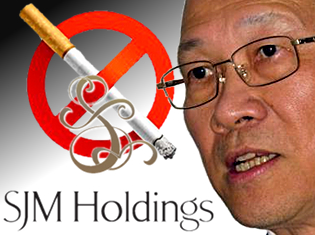 The CEO of casino operator SJM Holdings says he’s not bothered by his company’s shrinking share of the Macau gambling market. As Macau flirts with all-time monthly revenue records, Sands China is now just 1% back of slipping market leader SJM, but chief exec Ambrose So (pictured right) says he doesn’t regard the share pie as a “key index” of how things are faring.
The CEO of casino operator SJM Holdings says he’s not bothered by his company’s shrinking share of the Macau gambling market. As Macau flirts with all-time monthly revenue records, Sands China is now just 1% back of slipping market leader SJM, but chief exec Ambrose So (pictured right) says he doesn’t regard the share pie as a “key index” of how things are faring.
On Tuesday, So reminded reporters that Macau’s booming mass-market sector “is driven by accommodation.” SJM was the last Macau concessionaire to get approval to set up shop on Cotai and SJM’s existing roster of aging gaming joints can’t compete with the volume of hotel rooms on offer at the newer and more spacious Cotai properties. Mass-market gaming’s contribution to SJM’s revenue grew 3.9% in Q2, well off Macau’s overall mass growth rate. So’s convinced that SJM’s shiny new Cotai facility will allow SJM to attract more mass-market business when it opens in 2016 or 2017.
In the meantime, SJM’s aging facilities aren’t adapting well to Macau’s new smoking restrictions. In April, Macau’s Health Bureau fingered 28 casinos for failing to properly implement the required air quality measures, and SJM accounted for 16 of these laggards. So acknowledged the failure, but suggested some accommodation should be made for his older casinos, many of which feature much lower ceilings than newer establishments, making ventilation a more difficult or even impossible procedure. So has gone as far as to propose that some SJM facilities be exempted from the smoking ban altogether.
If Macau proves unwilling to level this playing field, So thinks Macau should butt out entirely. If a total smoking ban is inevitable – the government will weigh its options three years into the partial-ban phase – then just cut to the chase and spare casinos from spending the cash required to retrofit their buildings.
Whether Macau opts for a total smoking ban come January 2016 is anyone’s guess. But the government is likely aware of last month’s study showing ambulance calls to Colorado casinos fell 20% following the state’s own smoking ban. A study published in Circulation magazine found ambulance visits to Colorado casinos dropped 19% after the state passed its butt-out law in 2008. An even larger decrease (23%) occurred when the state banned public sector smoking two years earlier. The study’s authors concluded that the inability to fill your lungs with carcinogens, constrict your blood vessels or amp up your heart rate probably made people less likely to die. Unless you’re Spanish, in which case to hell with you.
